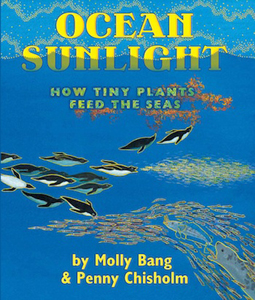2018 School Spending Survey Report
Review of Ocean Sunlight: How Tiny Plants Feed the Seas
Ocean Sunlight:
How Tiny Plants Feed the Seas
by Molly Bang and Penny Chisholm; illus.
 Ocean Sunlight:
Ocean Sunlight:How Tiny Plants Feed the Seas
by Molly Bang and Penny Chisholm; illus. by Molly Bang
Primary Blue Sky/Scholastic 48 pp.
5/12 978-0-545-27322-0 $18.99 g
Although it stands alone well, this book is a companion to Bang’s My Light (rev. 5/04) and Bang and Chisholm’s Living Sunlight (rev. 5/09). The authors bring a fresh perspective to the topic of food chains, focusing here on the critical and voluminous ocean-based plant life — plankton — and the transfer of energy and nutrients from the sun to these microscopic plants to ocean animals and back. After a brief overview of food chains and photosynthesis using a more-familiar land-based example, the narrative moves to the ocean. At the surface of the water, sunlight is absorbed by microscopic phytoplankton and eventually transferred to ocean animals through consumption of plankton by those in the shallower layers; for those where light cannot reach, energy is transferred through consumption of the animal and plant remains that drift downward. Energy-filled illustrations use glowing, brilliant colors — pulsing yellow sunlight hitting an electric blue sea; the delicate green skeletal spikiness of the microscopic plankton — and also contrast the “marine snow” (the remains of animals and plankton that sink down) with the inky depths where intriguing, transparent red and blue animals reside. These are sophisticated concepts for the target audience, but the authors employ clear and age-appropriate explanations, well-chosen text and visual analogies, and a series of rhetorical questions to excellent effect. Several pages of notes will be included in the final book.
From the May/June 2012 issue of The Horn Book Magazine.
RELATED
RECOMMENDED
ALREADY A SUBSCRIBER? LOG IN
We are currently offering this content for free. Sign up now to activate your personal profile, where you can save articles for future viewing.







Add Comment :-
Be the first reader to comment.
Comment Policy:
Comment should not be empty !!!